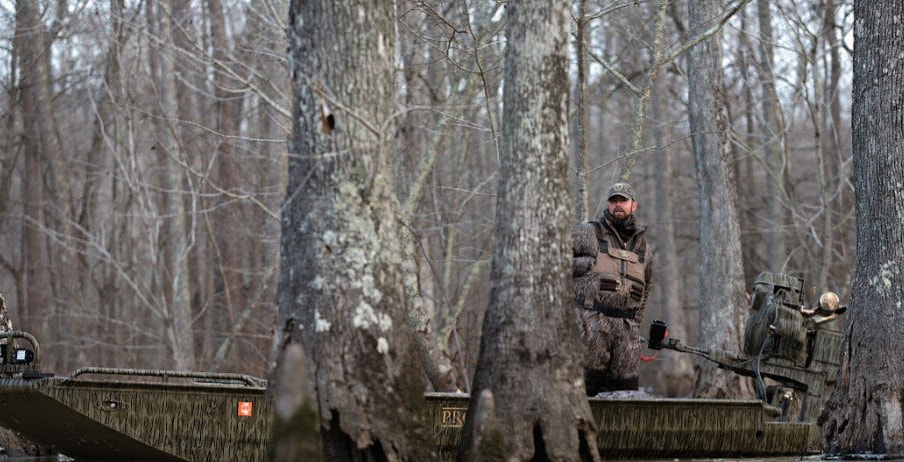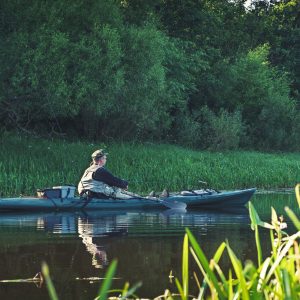Boating Safety: Everything You Should Know.
One way to beat the summer heat is to think cold thoughts. If I close my eyes and concentrate, my mind drifts back to a bone-chilling January day hunting sea ducks along the Maine coast. It was windy too, but not too windy to head out on the bay. Several layers of warm clothes and steady action kept us reasonably comfortable against the elements. We had a good hunt and all was well until we loaded up the boat and headed for shore. First the motor quit, and repeated efforts to revive it failed. That meant the back-breaking task of rowing against both, wind and tide, which also proved to be oarbreaking. Mild panic set in when one split in half, leaving us only one good oar. We’d have to do some quick thinking if we wanted to make it safely to shore.
With a single oar I paddled as hard and as fast as I could, alternating sides from time to time. Meanwhile, my partner would throw the anchor forward and pull us along as best as he could. Working together, we slowly but surely made gradual headway and by the time we hit the beach we were both completely exhausted.

There was little we could have done to prevent the motor or the oar from breaking, which only emphasizes that even under the best of circumstances, things can go wrong. And you have to be prepared when they do.
Humans are inexorably drawn to the water for recreation, and boats provide access to hunting and fishing locations and opportunities the land-bound hunter or angler can’t reach. But there’s also an increased risk that goes along with that, which is why safety must always be stressed. What follows are some general guidelines and advice to help you enjoy your time on the water and ensure you‘ll make it back safe and sound.
Preparation
When it comes to boating, there’s no such thing as being over-prepared, as the above example illustrates. Boating safety can literally be a life or death expedition. Still, there’s much you can do to improve your safety on the boat and prevent potential problems. One is to make sure your boat, motor and gear are in good working order. That’s especially true of your motor for obvious reasons. Don’t skimp. If you’re not a mechanic, take your boat to one and have it serviced regularly.
State and federal agencies require motorized vessels to have certain specific safety equipment like flares, a signaling device, fire extinguisher and PFDs (see sidebar). The latter are also required for “self-propelled” watercraft.
You should also carry a few other things like a compass, radio and at least a rudimentary tool kit, especially if you’re on “big-water.” Once you’re certain all is as it should be, you can load up and hit the water.
Overweight
Don’t overload your boat. Boats under 20 feet long have a plate indicating recommended capacity. It lists both the maximum weight and number of passengers. You should take this seriously and consider not just people but dogs and gear. Though they weigh less than we do, consider a dog as a person in your head count. Also try to estimate the weight of gear like decoys, anchors, shot-shells, fishing tackle, trolling motors and their batteries, coolers and even your livewell. When in doubt, always error on the side of caution. Capacity limits are based on calm conditions and should be reduced under less favorable circumstances.
Underway 
Know your limits. I was once accused of being too cautious by a fellow fisherman. I take that as a compliment. I grew up on the water, ran a 38-foot charter boat at age 15 and I’m a registered Maine Guide, so I understand my responsibility for the safety of every person aboard my vessel. You should too. You should be familiar with the capabilities and limitations of your boat and always abide by the motto: When in doubt, don’t go out. Hunting and fishing are “recreation” and there is no need for putting yourself or your passengers at risk. A good day of hunting or fishing from a boat is one that ends with everyone returning safely to the dock. The rest is gravy.
Before getting underway, distribute passenger weight evenly along a boat’s centerline. Fore and aft positioning will depend on your boat. Position your passengers so the boat gets up and runs easily on plane with the bow slightly raised. Also instruct passengers not to move around while underway, particularly at high speeds. A sudden shift in balance could cause problems, especially in smaller boats.
Before you go you should also file a float plan. Hunter safety instructors advise you to let someone know where you’ll be hunting and when you should be expected to return. If you don’t, they’ll know where to start looking, and will be able to find you faster should something go wrong. The same applies to boating, and you should include contingencies in your plan. Even a quick fishing trip across the lake could go south if the wind picks up and you can’t make it back. You may be simply laying low in a sheltered cove but if folks on shore don’t know that, they’ll be worried, and may unnecessarily mobilize rescue efforts.
While fishing a tournament with his father on Minnesota’s famed Mille Lacs Lake years ago, Editor in Chief, Todd Amenrud, witnessed two people just before they drowned because of making a fatal error. The two had ventured out in a boat much too small and an under-powered engine for both the boat and the big water. The lake encompasses 207 square miles and the two fishermen had ventured out miles from shore in a twelve foot aluminum V-bottomed boat with a 20 hp motor.
Conditions were fine when they left, but midday a nasty storm hit without warning. The winds produced twelve foot swells, but because of the depth and make-up of Mille Lacs, the waves have a fast configuration when compared to other lakes. Twelve feet would be tolerable on the ocean; however, because of the short distance between the rollers these waves plainly just beat them to death. Todd saw the boat start for shore about the same time he and his father did. They could only be seen when both boats were near the top of one of the big waves. All of a sudden the small boat just disappeared. Todd and his dad couldn’t turn around to look for them; they had to stay faced into the unrelenting pounding in fear of capsizing their own boat. Later that evening word spread around the lake that the two were missing – the next day their bodies were found.
Of course, if you have the right equipment, you may be able to notify them or others. Everyone carries a cell phone, but it won’t do much good if you’re in a dead cell, the battery dies or it gets wet. A two-way marine radio or an EPIRB (Emergency Position Indicating Radio Beacon) could save you from a long, uncomfortable night on the water or an island.

Just the same, you should still keep an emergency kit in your boat. In addition to the other mandatory safety equipment you should also include the aforementioned radio or EPIRB, a flashlight, fire-starting kit, emergency food like energy bars, water and a space blanket. Additional items will depend on personal preference. They’ll take up more space and add weight but could keep you safe and definitely more comfortable during an unexpected, extended stay. Keep all these items in a waterproof bag and inspect them periodically.
Know Before You Go
This one could and probably should have been the first item on our list but every boat operator should consider taking a boating safety course. Hunter safety instruction is mandatory and has resulted in a dramatic decrease in accidents. Simply knowing the rules of the water and understanding navigation aids could save you a lot of frustration and possibly money.

There are a few other safety tips we can borrow from the hunter’s safety classes. Never carry a loaded firearm in the boat. The reasons are obvious but there is one exception: when pursuing crippled waterfowl. Then, extreme caution is advised.
Never operate a boat while under the influence of drugs or alcohol. That’s more obvious for hunters, but just as important to fishermen, if not more so. Many folks enjoy a frosty beverage while fishing and unlike hunting, it’s legal. But alcohol is the leading contributor to boating accidents. The key is moderation. Let your buddies have a good time, but the boat operator should remain sober.
Safety classes will also teach you how to react should something go wrong. You’ll learn things like: When in doubt, throw it out. If you’re lost in the fog or your motor breaks down, your best first step is often to drop anchor. That will keep you from possibly drifting into further peril where you might end up on the rocks. A course will teach you, but if you don’t take one you should still be familiar with the “rules of the road” (see sidebar). Make sure that your boat’s running lights are operating properly and use them whenever you’re on the water between sunset and sunrise.






